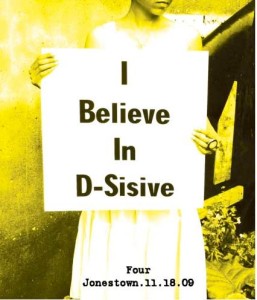In addition to the stories by artists, composers and filmmakers in this section of the jonestown report, we learned of these other developments within the past year:
• MSNBC won a 2009 Clarion Award for its documentary Witness to Jonestown, a documentary film to coincide with the thirtieth anniversary of the deaths in Guyana. The award for best “Television Documentary Program-National” was presented by the Association for Women in Communications.
The documentary was also nominated for two Emmys by the National Academy of Television Arts and Sciences. The film itself was one of five nominated in the category of “Outstanding Historical Programming: Long Form.” Producer Stephen Stept was one of four people to receive a nomination in the category of “Outstanding Individual Achievement In A Craft: Writing.”
Stephen Stept’s story about producing the documentary from last year’s jonestown report appears here.
• A play about a survivor of the Jonestown tragedy premiered in New York in mid-July 2009. Run Fast the Fire, written by Ellen Lindsay, played for three nights during the Midtown International Theatre Festival. As Ms. Lindsay described the work during its promotion: “November 1978. Jonestown. The jungles of South America. Over 900 Americans dead. One United States Congressman assassinated. One woman who survived will talk about it for the first time tonight. This show is her story.”
 • Rapper D-Sisive has recorded an album entitled Jonestown, set for release on November 18, 2009, the thirty-first anniversary of the tragedy in Guyana. Inspired by reviews he received for an earlier work entitled Let the Children Die, Derek Christoff – the rapper’s real name – described the music in a newspaper article as “total, hardcore hip-hop.”
• Rapper D-Sisive has recorded an album entitled Jonestown, set for release on November 18, 2009, the thirty-first anniversary of the tragedy in Guyana. Inspired by reviews he received for an earlier work entitled Let the Children Die, Derek Christoff – the rapper’s real name – described the music in a newspaper article as “total, hardcore hip-hop.”
• The Atlanta quartet The Black Lips has also evoked Jonestown images in its latest CD. According to press reports, on the song “The Drop I Hold,” singer Cole Alexander raps over the audio from the death tape found at the scene of the Jonestown mass deaths.
• The Eccentrics, a group of four actors who chronicle San Francisco’s past – especially the city’s colorful residents who have given it a reputation of being more than off-beat – have added Peoples Temple founder Jim Jones to its repertoire. The troupe has presented its take on the city’s history for six years, including an extended run this past spring and summer at the Chancellor Hotel, but decided to interpret more contemporary characters such as Jones this past year, according to the San Francisco Examiner.
• Themes from Jonestown appeared in the novel In the Crosshairs of Deception, written by Ken Reamy, a former evangelical pastor and newspaper report who lives in southern Colorado. Drawing upon Jonestown more as a warning than as an actual place, the book revolves around the disappearance of a young woman who ends up being held against her will in a religious cult.
As described in The Pueblo Chieftain, “Reamy has included references to cult domination and cult leaders such as David Koresh of the Branch Davidians, Jim Jones and the Peoples’ Temple, and Charles Manson, and he says his book analyzes how people become victims of cult dominance and control, and how their experiences affect those around them.”
• “Miracle,” a work of music and dance performed by BalletLab which premiered in Australia in mid-July 2009, considers the impact of “religious icons, myths and modern-day cults,” and includes Peoples Temple as an example of a “revolutionary evangelistic group.”
• The story of the success of Rob Jones – the grandson of Jim Jones – on the basketball court was presented as short documentary piece on the ESPN Sports Network in 2007. Earlier this year, ESPN announced it would expand the story into a theatrical feature.
As reported by Steven Zeitchik of Reuters on March 6, 2009:
The Jones feature – which will be written by Sang Kyu Kim, who also has written for Starz’s “Crash” series – will center on Jim Jones Jr., the son of the reverend who lost most of his family in the 1978 Jonestown massacre. He went on to raise a family including a son, Rob, who now plays basketball for the University of San Diego.
Jones Jr., an adopted son of the cult leader and just 18 at the time of the Peoples Temple tragedy, said that basketball and life’s larger lessons were intertwined. “The sound of a bouncing basketball initially hurt and then healed a family in the aftermath of Jonestown,” he said. “Our history and hope (is) that this shared story could be a new legacy to the Jonestown tragedy.”
Rob Jones has since transferred from University of San Diego to finish his collegiate academic and sports career in the Bay Area.